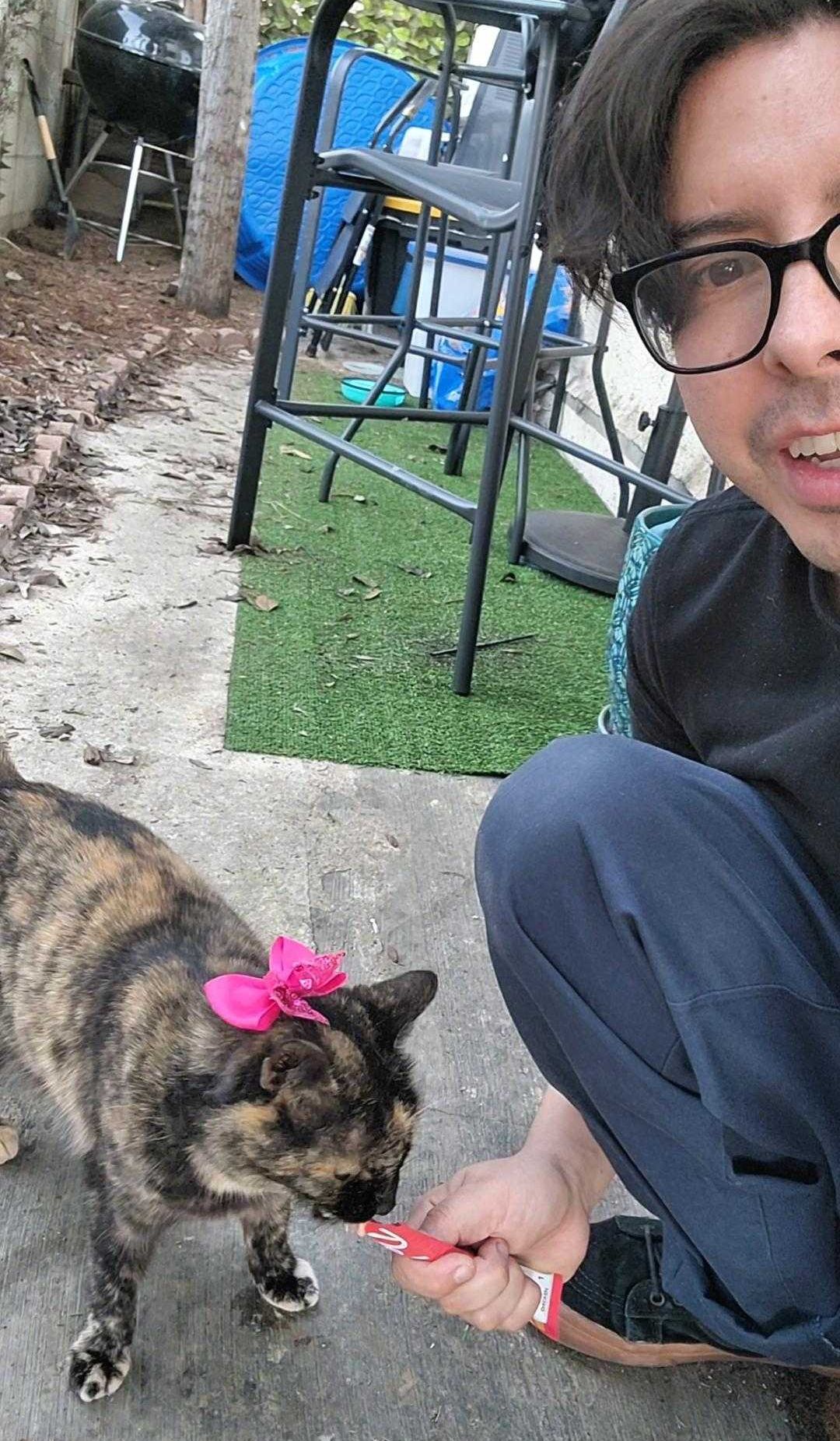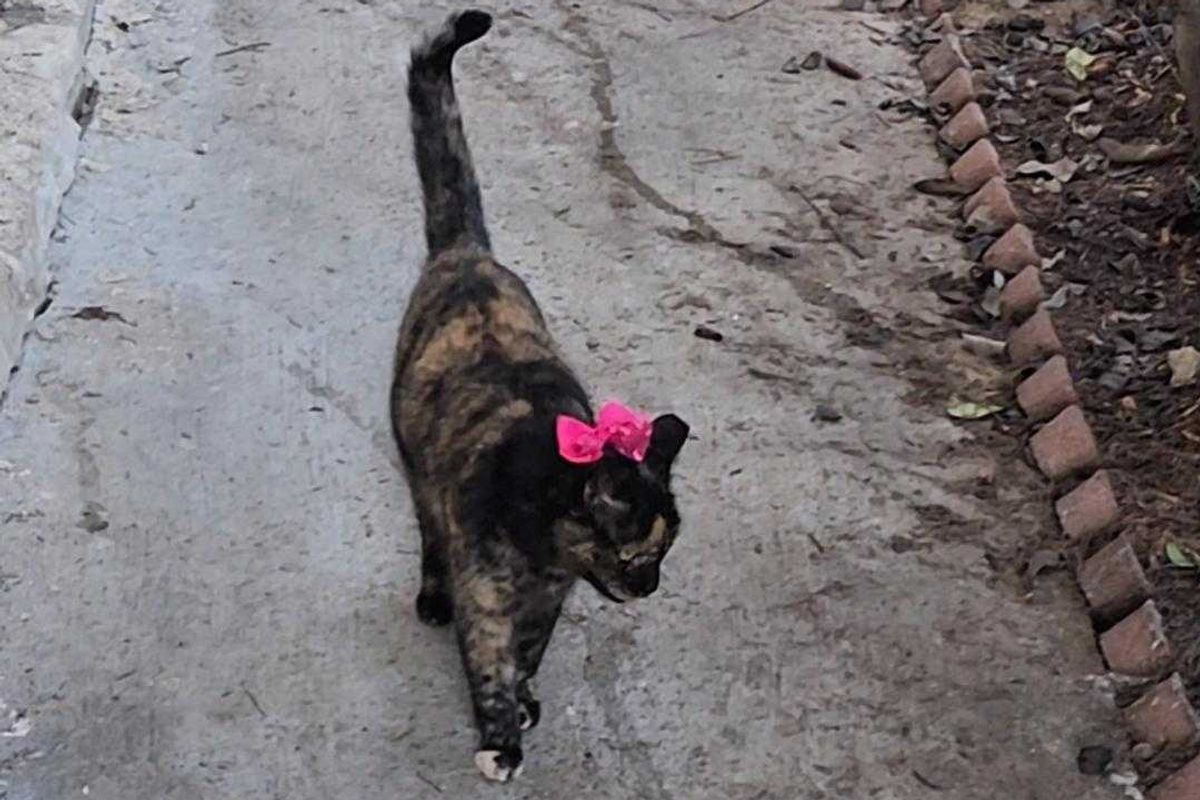Cat owner adorably finds out his cat Gloria is living many secret lives
"My cat was in my neighbor's Xmas photo last year."
Gloria the cat strolls in with a pink bow.
If you love a cat video AND surprises, then meet Gloria. This rambunctious little tortoiseshell cat has an entire life so separate from her owner at times, he has to piece together stories from random clues. Said cat guardian is comedian Martin Rizo, who, alongside a few small dogs, has had Gloria for about six years.
In a Facebook Reel, Rizo shared a clip of Gloria returning home from an adventure with a hot pink bow on her head. A chyron initially appears on screen asking, "When you know your cat has other families. She came back with a hair bow."
In the clip, we see Gloria stroll in with a giant hot pink "hair" accessory tied lovingly around her neck. Rizo asks, "Bro. How many owners do you have? How many names do you have besides Gloria? I don't even know who you are! How many families do you have? How many times do you eat per day?"
Gloria is then seen playing with a cat treat on the ground. Rizo continues his line of questioning while giving her gentle head scratches. "Am I your favorite owner?" Gloria then jumps off the couch. "Where are you going? Oh, you're going over there again, huh? Please don't go, wait." At the bottom of the Reel, he asks, "Does your cat cheat on you also?"
The comment section is on fire. Those who have "outside cats" are probably aware that their kitty's adventures often lead them to all sorts of hijinks around town. At over 224,000 likes and nearly 4,000 comments, people have opinions and their own stories.
One hilarious Facebook follower shares, "My cat was in my neighbor's Xmas photo last year. In a 'blanking' Xmas outfit."

Another shares a photo of their black cat dressed in some sort of checkered sweater, saying, "This happened to me this week. The cat came back looking like this. But ready for food."
This person relays that they met the "other" family, writing, "Our cat disappeared for a few days, then came home a couple of days. After this happened a few times, we followed her. This is how we found out she 'adopted' the neighbors. We named her Fancy and the neighbors named her Pepperoni, so she is now Fancy Pepperoni and we share custody."
Upworthy had a chance to chat with Rizo, who explained that Gloria was (and still kind of is) a stray in every sense of the word. "Once a stray, always a stray. So I guess she lives here part time. But I do see her every day, and there are nights she won't come home."

He further explains that Gloria's relationship with the neighbors is also quite special. "I have seen her chilling at the neighbors—sitting on their lap. I do need to follow her one of these days to see where she goes."
Some commenters point out the dangers of not keeping one's cat indoors. One person politely suggests, "Please put a collar on ur kitty so someone doesn’t take her. Edit: to everyone trying to argue that cats can get hurt/caught if they have a collar on… please educate yourself on breakaway collars."
In the article "Are Outdoor Cats Happier?" The Animal Humane Society experts have thoughts. "People who let their cats outside may have the best intentions, but that doesn’t change the outcome of a recent study, which found the average life span of a cat is dramatically shorter for those that roam freely outdoors — by as much as 10–12 years!"
That said, there are some cats who truly take the world as their oyster. Their sense of adventure merely can't be contained with cat nip and a climbing tree. Even the Humane Society accepts that "community cats" exist. They note, "Community cats are un-owned cats that live outdoors in the community. They may be feral or friendly, may have been born into the wild, or may be lost or abandoned pet."
Gloria is neither lost, nor abandoned. Her love is simply too big to give to just one family, and it seems her admirers wouldn't have it any other way.

